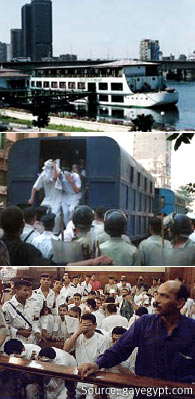President Hosni Mubarak has annulled jail terms for 21 Egyptian men convicted of gay sex on November 14 after a mass trial by the high state security court and ordered prosecutors to review their cases and those of 29 others who were acquitted, court sources said last week.

From the top: Queen Boat where the men were arrested, the men being transported to court, defendants in the courtroom last November.
However, prosecutors may still decide to seek a retrial not only for those men but for the 29 acquitted. Any retrial would be held in an ordinarily court, rather than an Emergency State Security Court - a repressive" anti-terrorist" court which heard the original case, and which does not allow appeal.
Under emergency laws in force since 1981, the President is the only official in the country who can confirm or overturn verdicts given by the high state security court.
The President, however, ratified jail terms of five years and three years for two of the 23 men who were convicted.
Sherif Farahat, the lead defendant in the case whose verdict was upheld, was sentenced to five years in prison for "scorning religion" and "sexual practices contrary to Islam."
Mahmud Ahmed Allam, whose sentence was also upheld, was jailed for three years for scorning religion.
The remaining 50 defendants, most of them in their early 20s, had been charged with "practicing debauchery with men." Twenty of them were sentenced to two years in prison while one was jailed for a year.
The police raided and arrested the patrons of the Queen Boat discotheque in Cairo, on or around the night of May 10/11, 2001 while other arrests were made within the next days. Civil rights organisations reported that the 52 were tortured, and jailed until their trial.
Defense lawyers argued that proper arrest procedures were not followed, that the arrests were made at random, and that charges were fabricated by ambitious vice squad officers. The State-controlled media engaged in a campaign of vilification against the 52, publishing their names and branding them perverts, blasphemers, and traitors. All 52 pleaded innocent.
While homosexuality is not explicitly prohibited under Egyptian law, which is based on Islamic law, gays have been persecuted with a range of laws covering obscenity, prostitution and debauchery.
The prosecutor can now decide to shelve the case or refer it to a criminal court, rather than keep it before the high state security court.
Since it opened on July 18 last year, the trial stirred the wrath of gay rights and human rights organisations, particularly in Switzerland, France and the United States.
